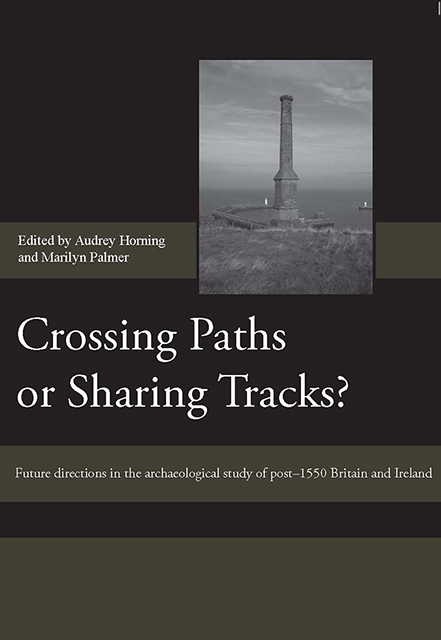 Crossing Paths or Sharing Tracks?
Crossing Paths or Sharing Tracks? Published online by Cambridge University Press: 07 March 2023
This chapter explores some current traditions in post-medieval landscape archaeology and in landscape studies as practised by other relevant disciplines. It advocates an approach to landscape that aims to mediate between a well-grounded understanding of material conditions, possibilities and constraints, on the one hand, and human actions and experiences, on the other. It argues that this is best realised through a cross-disciplinary dialogue with a particular focus on the recursive relationship between the varied evidence, methods and interpretations of the diff erent interested disciplines. However, the aim of this dialogue should not be the final resolution of dissonances between diff erent lines of evidence and interpretation. While a common basis is required for any eff ective collaboration, it is argued here that the most productive way forward is to seek to value rather than erase persistent dissonance. These general issues in post-medieval landscape studies are explored in detail through a case study: the early history of the estate of the Campbells of Glenorchy in the Scottish Highlands.
INTRODUCTION
In recent decades, landscape has emerged as a subject of some importance within postmedieval archaeology, although no single approach has come to dominate the field and perspectives range from those with a strict empiricism to those seeking an understanding of past experiences and meanings. At the same time, landscape has become more of a concern for other historical disciplines, each of which has its own perspective: drawing on diff erent evidence, employing its own methodologies and seeking to address its own interpretive concerns.
In the spirit of dialogue engendered by the Crossing Paths or Sharing Tracks? conference, my aim is to consider the benefits that a cross-disciplinary dialogue might have for our understanding of the post-medieval landscape, and the shape that such a dialogue should take. My starting point is a consideration of two current traditions in landscape archaeology, referred to here as evolutionary landscape history and the experiential approach. Each of these has made a significant contribution to landscape studies, but I will argue that neither is adequate in its current form.
To further the discussion, I will use the example of environmental history to exemplify the potential of a cross-disciplinary dialogue concerning landscape. This subject has brought historians, environmental scientists and others together through a common interest in the relationship between humans and the environment.
To save this book to your Kindle, first ensure [email protected] is added to your Approved Personal Document E-mail List under your Personal Document Settings on the Manage Your Content and Devices page of your Amazon account. Then enter the ‘name’ part of your Kindle email address below. Find out more about saving to your Kindle.
Note you can select to save to either the @free.kindle.com or @kindle.com variations. ‘@free.kindle.com’ emails are free but can only be saved to your device when it is connected to wi-fi. ‘@kindle.com’ emails can be delivered even when you are not connected to wi-fi, but note that service fees apply.
Find out more about the Kindle Personal Document Service.
To save content items to your account, please confirm that you agree to abide by our usage policies. If this is the first time you use this feature, you will be asked to authorise Cambridge Core to connect with your account. Find out more about saving content to Dropbox.
To save content items to your account, please confirm that you agree to abide by our usage policies. If this is the first time you use this feature, you will be asked to authorise Cambridge Core to connect with your account. Find out more about saving content to Google Drive.